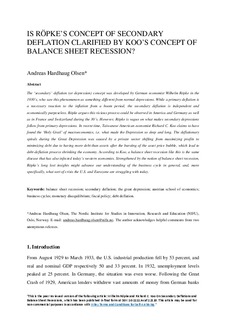| dc.description.abstract | The concept of a ‘secondary deflation’ was developed in the 1930s by the German economist Wilhelm Röpke, who saw it as something different from a normal depression. While a primary deflation is a necessary reaction to the inflation from a boom period, a secondary deflation is independent and economically purposeless. Röpke argued that secondary depressions occurred in the US, Germany, France and Switzerland during the 1930s, but was vague on what made them follow primary depressions. Recently, the Taiwanese–American economist Richard C. Koo has claimed to have discovered the ‘Holy Grail of macroeconomics’, that is, what made the Great Depression so deep and long. During the Great Depression, the bursting of the asset price bubble resulted in private sectors having more debt than assets; as they shifted from maximising profits to minimising debt, the consequent debt deflation shrank the economy. According to Koo, Western economies today are suffering from a similar ‘balance sheet recession’. Strengthened by the notion of a balance sheet recession, Röpke's long-lost insights might advance our understanding of the business cycle in general and the present crisis in the US and the Eurozone in particular. | nb_NO |
